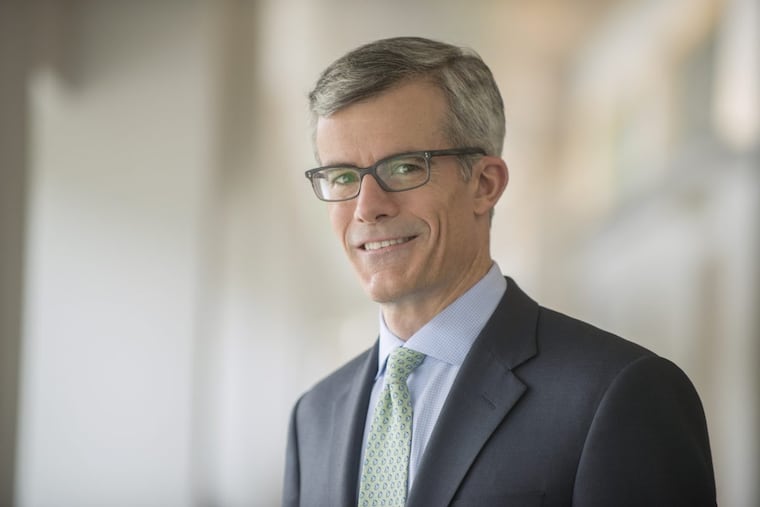What we know about new Vanguard CEO Tim Buckley
Former co-workers consider the 48-year-old Wayne resident a logical successor to McNabb, one who has a long history at Vanguard and understands the culture. He has been part of Vanguard's senior leadership since 2001, serving as chief investment officer since 2013 and as chief information officer from 2006 to 2012.

As one of the world's largest asset managers, the Vanguard Group attracts money from investors all over the world. So it's no wonder a very bright spotlight is shining on Mortimer "Tim" Buckley, who will take over as chief executive at the end of the year.
On Thursday, Buckley was named successor to William McNabb, who spent about three decades at Vanguard, 10 of them as CEO.
What do we know about the investment giant's new leader-to-be? He's a consummate Vanguard insider.
Buckley majored in economics at Harvard and, according to several past interviews, considered a career in medicine like his mother, a nurse, and his father, a high-profile physician who headed the cardiac surgical unit at Massachusetts General Hospital in Boston.
He rowed crew in college and is an avid bicyclist, as is his predecessor, McNabb. "If I have to blow off steam, you'll find me out on my bike," Buckley said in one interview. "I don't have the choice to run. My knees are gone, so bicycling is better."
In 1991, his first job out of college was as assistant to then-CEO John Bogle, when he helped the firm's founder research his first book. Buckley returned to Harvard for an MBA, then went back to work at Vanguard in 1996. Among his first projects was an analysis tracking Vanguard's main competitors, which provided perspective on its advantage as a mutual-funds company.
Former coworkers consider Buckley, 48, who lives in Wayne and is married with three children, a logical successor to McNabb, one who has a long history at Vanguard and understands the culture. Soon to become Vanguard's fourth CEO, he's been part of its senior leadership since 2001, serving as chief investment officer since 2013. He was Vanguard's chief information officer from 2006 to 2012.
"What I do know is all positive," said a person who worked closely with Buckley but didn't want to be identified because of an ongoing professional relationship. "He was a very smart guy, and more importantly, a good guy. He knows the place inside and out. I have no doubt it's a good transition for Vanguard. There will be continuity."
Greg Davis, global head of Vanguard's fixed income group, will take on Buckley's prior role as chief investment officer. John Hollyer, head of Vanguard's risk management group, will assume Davis' current position. Hollyer's role will be assumed by Rodney Comegys, a principal at Vanguard and head of investments and equity investment group for Vanguard Asia Pacific.
Local investors have high hopes for Buckley, who will oversee a company that controls a huge piece of the index-fund market.
"McNabb's best contribution was taking Vanguard firmly beyond the 401(k) and do-it-yourself marketplace," said Matt Taylor, partner at Permit Capital Advisors LLC, a West Conshohocken family office. "By embracing ETFs [exchange-traded funds], McNabb expanded Vanguard's presence in the larger adviser market, while remaining true to Vanguard's investor-focused mission."
"McNabb was concerned about the possible negative effects of large blocks of passive investors owning public companies. As passive-market share continues to grow, there will be more pressure on passive investors to demonstrate that they are truly aligned with their investors and not the management of the companies they own," Taylor said. "Tim Buckley, Blackrock, and State Street will all grapple with this issue over the next 10 years as they become a dominant block of ownership for most publicly traded companies in the U.S. and frequently, internationally. Being good stewards of investors' assets will require a degree of active governance that was not an issue when Vanguard was a quarter of the size it is today."
Under McNabb, assets have quadrupled, with Vanguard currently managing $4.4 trillion. In 2017 alone, the firm — whose headquarters are in Valley Forge — has been taking in about $1 billion a day in new assets. Vanguard now holds about half the U.S. market for index mutual and exchange-traded funds, according to Bloomberg data.
Vanguard's success in raising assets and bringing more investors over to passive investing even prompted financial guru Warren Buffett to tip his hat to Bogle in his latest Berkshire Hathaway annual letter:
"If a statue is ever erected to honor the person who has done the most for American investors, the hands-down choice should be Jack Bogle. For decades, Jack has urged investors to invest in ultra-low-cost index funds … In his early years, Jack was frequently mocked by the investment-management industry. Today, however, he has the satisfaction of knowing that he helped millions of investors realize far better returns on their savings than they otherwise would have earned. He is a hero to them and to me."
"Over the years, I've often been asked for investment advice, and … my regular recommendation has been a low-cost S&P 500 index fund," Buffett wrote. "To their credit, my friends who possess only modest means have usually followed my suggestion."